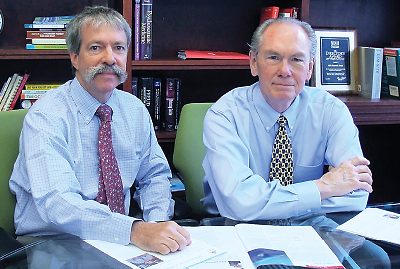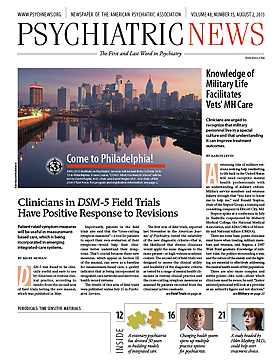A unique training program merging standard psychiatry residency with Ph.D.-level research training in neuroscience and genetics is being funded by the National Institute of Mental Health (NIMH) at the Icahn School of Medicine at Mount Sinai in New York.
The program directors are Ronald Rieder, M.D., vice chair for education, and Wayne Goodman, M.D., chair of the Department of Psychiatry.
The new training program will allow graduates from medical school to enter a program offering full psychiatry residency training and also earn a Ph.D. over seven years. The program will begin enrolling trainees at the first- and second-year levels in July 2014. On June 25, NIMH awarded the school a little over $175,000 for the first year of the program, with increasing amounts each year through 2017, and future funding will be determined on the basis of availability of funds and progress of the project.
In an interview with Psychiatric News, Rieder explained that in the Psychiatry Residency + Ph.D. Program, the clinical work of the standard residency program will be concentrated in the first three years, with didactic classwork toward the Ph.D. concentrated in the second and third years. The fourth through seventh years will be focused on a research project, thesis, and publications.
“Throughout the entire seven-year program, residents will continue with clinical work as part of their residency training,” Rieder said. “From year 4 through year 7, 80 percent or more of the trainees’ time will be spent on research.” Because of this, during those years the trainees will be eligible for the National Institutes of Health Loan Repayment Program, which could pay off up to $35,000 for each year of loans for college and medical school.
Rieder said he believes the program is a significant innovation and may serve as a new model for training psychiatrist-scientists. He added that the prevalent model by which most trainees receive M.D.-Ph.D. degrees through the Medical Scientist Training Programs (MSTP) in U.S. medical schools is costly, lengthy, and inefficient.
Typically in the MSTP, students begin Ph.D. training after completing two years of medical school classes; this Ph.D. training then takes as long as is necessary to complete and defend one’s thesis—on average four to five years. The student then begins the primary clinical year of medical school, followed by the final year, which usually involves mostly clinical electives.
This is followed by residency, which may be in a different school or city and is almost always heavily clinical for three years, with various amounts of elective time for research only in the fourth year. “So for psychiatrists who have pursued the traditional M.D.-Ph.D. route, there are at minimum five clinical years that separate the intensive period of Ph.D. research from the time that full-time research can be resumed,” Rieder said. “The clinical experiences may lead to a graduate’s never resuming research. How often this occurs is not known, but our own observations reveal it is not rare.”
Moreover, few candidates who complete an M.D.-Ph.D. program go into psychiatry. So the new seven-year program combining psychiatric residency and Ph.D. training at Mount Sinai represents what may prove an efficient way to produce psychiatrist-scientists who will be adept at the kind of translational research that links genetics and neuroscience with treatment studies, Rieder said.
Rieder was member of a 2008 National Advisory Mental Health Council Workgroup on Research Training, sponsored by NIMH, which focused on the development of a new cadre of research psychiatrists. (Goodman was previously director of the Division of Adult Translational Research and Treatment Development at NIMH.)
“There is a real interest at NIMH in having M.D.-Ph.D. scientists who are psychiatrists,” Rieder told Psychiatric News. “Research on the genetic and neurobiological etiology of mental illness is very difficult and sophisticated, and any physician who is applying for grants to do that kind of research will be competing with Ph.D. neuroscientists, so it’s extremely useful for psychiatrist researchers to also have the knowledge and skills from Ph.D. training.
“There is also a strong belief that physicians, because they understand mental disorders at the clinical level, are going to be more oriented toward translational research that will really help us bridge etiological research with new treatments for psychiatric illnesses.”
In the application for funding for the new seven-year psychiatric residency and Ph.D. program, Rieder and colleagues wrote: “Those with psychiatric training will have a greater level of knowledge of the phenomenology and treatment responses of patients with psychiatric disorders, a stronger commitment to do research of benefit to patients with psychiatric disorders, more experience in conducting research on patients with psychiatric disorders, and more familiarity with ways in which translational research in other areas of medicine has been conducted and led to clinical implementation, than those who are not M.D.s and have not had psychiatric training.”
They added that the development of animal models of psychiatric disorders requires in-depth knowledge of the disorders themselves and that an essential aspect of translational research is the extension of laboratory findings to humans in psychobiological or therapeutic studies.
“In addition to the possible advantages of psychiatrist-Ph.D.s, it should be emphasized that Ph.D. training itself directly connects the M.D. psychiatrist with Ph.D. mentors and colleagues, developing collaboration skills during the training period,” Rieder and colleagues stated. “These are likely to continue after Ph.D. training if the trainee, as we envisage, directly continues in research after this new training program.” ■

